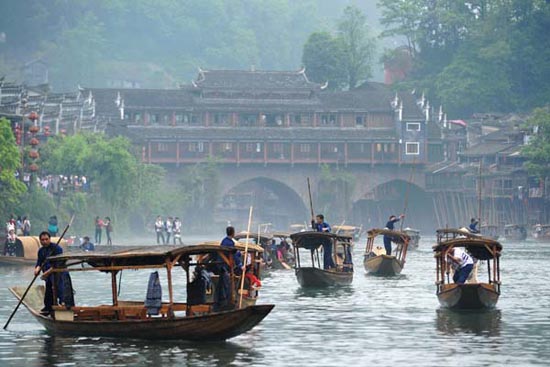
 |
| Punters in Fenghuang, Hunan province, find fewer tourists on Monday, the start of the three-day May Day holiday, after the scenic spot started charging an entry fee. San Mo / For China Daily |
Some scenic spots still make visitors pay through the nose despite the nation's new Tourism Law
In spite of China's new Tourism Law, which seeks to curb price hikes at scenic spots across the country, many famous sites are still able to get visitors to pay top dollar to gain entry.
The law, adopted by China's top legislature on April 25, outlined strict controls on the cost of tickets to enter scenic spots.
The National Development and Reform Commission published a list of more than 1,200 scenic spots lowering their entry fees during the May Day holiday from April 29 to May 1.
These scenic spots, where prices have fallen by around 20 percent, include 60 5A-level tourist attractions, the highest level, as well as 350 4A-level, and 800 3A-level sites.
However, the new policy, which is intended to attract more tourists, has received a muted response.
Ji Shubin, an accountant from Nanjing, said that she did not find the list to be very attractive.
"The places I am interested in do not offer a lower price," she said. "Five spots in Beijing are on the list, but I have not heard any of them before."
The five spots on the list are all in the suburbs of Beijing, while well-known and must-see sites such as the Tian'anmen Rostrum and the Summer Palace are not included.
"Instead of going to places with discounts that I have no interest in, I would prefer to go to places I really like, regardless of the price," she added.
Some other sites on the list are only offering a discount after the end of the May Day holiday.
For example, Famen Temple, a well-known Buddhist place of worship in Shaanxi province, lowered its ticket price from 120 yuan ($20) to 95 yuan, from May 2 to 4. And the scenic area in Zhangjiajie, Hunan province, which is famous for its beautiful forests and mountains, will cut ticket prices by 20 percent as required by the National Development and Reform Commission, but only from May 2 to May 7.
Zhan Dongmei, an expert from the China Tourism Academy, said this is an attempt to prevent overcrowding of the sites during public holidays, by encouraging people to visit at other times.
"But our vacation ends on May 1," Ji said. "I cannot ask for leave after the vacation."

















 Different walks of life in China : Labor Day
Different walks of life in China : Labor Day


![]()
